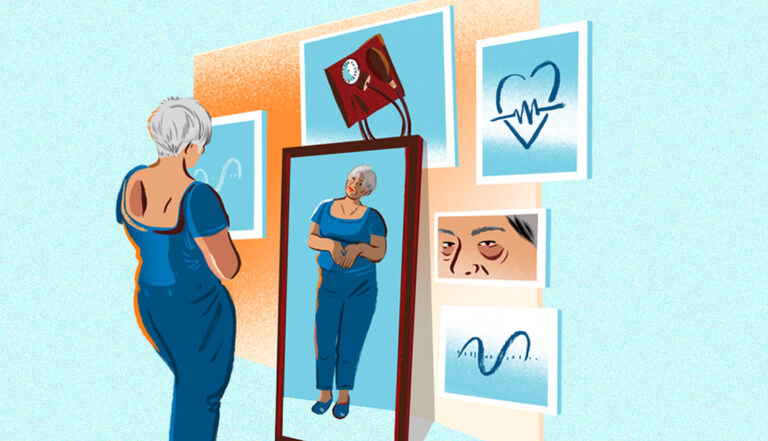[ad_1]
“Visceral fat releases fatty molecules into the blood. And it’s invaded with immune cells called macrophages that create low levels of chronic inflammation in the body,” explains Jean-Pierre Després, a professor at Université Laval in Quebec City, Quebec, and a leading body fat and health researcher.
Visceral fat can wrap around your heart and kidneys and infiltrate your liver, boosting risk for diabetes by interfering with your body’s ability to absorb blood sugar, says cardiologist Ian J. Neeland, M.D., codirector of the Center for Integrated and Novel Approaches in Vascular-Metabolic Disease at University Hospitals Cleveland Medical Center. “It’s a big driver for cardiovascular disease.”
Meanwhile, our immune system becomes more sluggish as we age, a problem compounded by excess fat. “Obesity is the silent killer of the immune system,” says David Bartlett, adjunct assistant professor of medicine at Duke University.
Our immune system gradually declines from our 40s into our 70s, and then begins a precipitous drop in our 80s, leading to a decline in the production of effective antibodies that can neutralize viruses, says Laura Haynes, a professor of immunology at the UConn Center on Aging in Farmington, Connecticut. “The other thing that happens with age is an increase in systemic inflammation, which may be driven by increased body fat. The more fat you have, the more inflammation.” Inflammation disrupts the immune system as well as your hormonal system. According to the Centers for Disease Control and Prevention, obesity is linked to at least 13 types of cancer.
A combination of aerobic and strength training is the answer, says Bartlett. “A fair amount of observational data shows that if you’re physically active, you can improve your immune system, even if you start later in life,” he says. “Exercise moves cells around the body and into the blood, including dysfunctional T cells, which end up being cleared out of the body. In older athletes, we see a T cell profile similar to someone who is much younger.”
How we think about weight
As we reach age 70-plus, many of us are finding freedom at last from old body-shame stigmas.
Surveys by University of North Carolina at Chapel Hill researchers found that women in their 70s were the least dissatisfied with their bodies and the least likely to say they thought about their weight every day — or several times a day.
That said, disordered eating remains an issue for older people, says psychologist and body image researcher Lisa Kilpela, an assistant professor at the University of Texas Health Science Center at San Antonio. Binge eating was a problem for up to 26 percent of women ages 60 to 83 in a recent study by Kilpela and others. “For the longest time, people didn’t think older women had eating disorders,” Kilpela says. “Older women who come to our lab say things like, ‘Thank you for thinking of us. We thought we’d be the forgotten ones because of our age.’ ”
While there’s little research on body image in men over age 70, all of the participants in one University of British Columbia study of 28 men ages 65 to 83 said they felt grateful for what their bodies could do. Yet at the same time, most had frustrations about age-related changes, including muscle loss and extra pounds.
At any age, though, your mental health can suffer if you struggle with body dissatisfaction. Paired with weight stigma, body dissatisfaction is associated with a higher risk for depression. In a 2021 study of 181 women ages 50 to 86, Kilpela also found that women with a negative body image got poorer sleep and had less social support. A negative body image is also associated with eating a less-healthy diet and getting less physical activity, says psychiatrist Debra Safer, M.D., the codirector of the Stanford Adult Eating and Weight Disorders Program at Stanford University in California.
Regardless of how you look, or how you feel about how you look, discussing your weight with a health care provider is a smart idea. Our diet culture caters to young people; too few of us know about the positives, and negatives, of weight loss and weight gain after age 70, and what it all means for your unique shape.

4 Healthy Weight Steps to Take Today
Maintaining a healthy weight as we age — not too heavy, not too lean — is crucial to maintaining our independence. Here are some simple strategies that will keep you in shape while making sure you get the nutrition you need.
1. Start your day with protein
Studies show that “protein timing” — eating 25 to 30 grams of protein in the morning and the same amount at lunch and dinner — helps people at midlife and beyond maintain muscle mass, which in turn reduces fat gain.
2. Choose farm foods over factory foods
That means fruits, vegetables, nuts, seeds, seafood, olive and avocado oils, low-fat dairy and lean meat throughout the day. The fewer processed foods, the better. Foods in their natural form are the basis of the Mediterranean and DASH diets, which are consistently rated as the best programs for weight management, heart health and longevity.
3. Move at least 30 minutes a day
Daily active living beats having a few weekly gym sessions and sitting around the rest of the time. Aim for a total of at least 150 minutes of movement per week — walking swimming, biking, gardening — for cardiovascular fitness, and at least two days a week of resistance training for muscular strength.
4. Cut down on simple carbs, especially sugar
Simple carbs like cookies and chips not only fill you up with calories while providing minimal nutrition, but a higher carbohydrate intake leads to water retention, making you look, feel and weigh heavier.
[ad_2]
This article was originally published by a www.aarp.org . Read the Original article here. .



